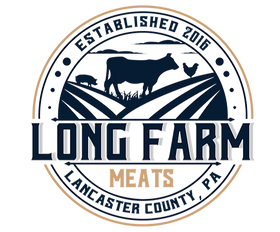Rooted in History. Growing with Purpose.
We’re the Landis family, 10th generation farmers in Lancaster County PA. With our four young children by our side, we believe in working hard, living simply, and doing things the old-fashioned way—together, as a family. For us, farming isn’t just a profession—it’s a way of life. A way of giving back to the land and providing honest, nourishing food to families just like ours.


Our Farm & Philosophy
We raise 100% grass-fed Black Angus beef and heritage Berkshire pork on 128 acres of pasture and rented hayfields. Our cattle are never given grain—only pasture, fermented hay, and dry hay. We believe this not only honors the way animals were created to live, but also delivers a beef product that’s healthier, more flavorful, and better for the land.
We work with trusted local farmers who raise their calves to thrive on a grass-fed diet, and we finish them on our farm using our strict grass-fed program. Since 2017, we’ve grown the herd by 90% and transitioned from commercial cattle to a fully direct-to-consumer model—allowing us to serve families all across the tri-state area with confidence and transparency.
Our mission is simple: to provide you with honest, high-quality meat you can feel good about feeding your family. Grass-fed beef is leaner, richer in nutrients, and raised more sustainably. It’s better for your health, better for the environment, and better for the animals.


A Farm Rich with History
The land we farm isn’t just special to us—it’s a part of American religious and architectural history. This farm is home to the Isaac Long Barn, built in 1754, and is considered the earliest-known, dated Pennsylvania-German barn.
The Long farmhouse is another landmark—its roof is the only surviving 18th-century clay-tile roof in Lancaster County. Originally built by Mennonite immigrants Hans and Anna (Snavely) Long, the stone house and barn reflect centuries of craftsmanship and care.
This remarkable structure was documented during the Great Depression as part of President Roosevelt’s New Deal through the Historic American Buildings Survey (HABS). Noted architect and author Charles H. Dornbusch photographed and studied the barn, later publishing his work in Pennsylvania German Barns (1956).
Follow Along @longfarm1754








